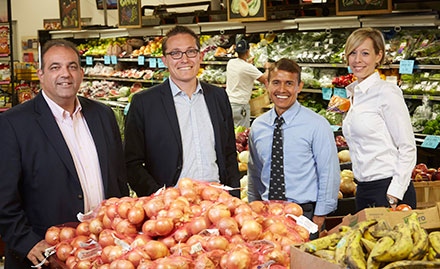The Right Recipe
February 14, 2018
The Lerner Center is partnering with other local institutions to bring better health options to Syracuse’s Near Westside.
From Maxwell Perspective...
For residents of Syracuse’s Near Westside — one of the city’s poorest neighborhoods — access to and affordability of healthy foods has long been a challenge.

Representing the Near Westside coalition are (from left) Paul Nojaim, president and owner, Nojaim Brothers Supermarket (the site of this photo); Maarten Jacobs, director, Near Westside Initiative; Roberto Martinez, project coordinator at the Lerner Center, and Rebecca Bostwick, Lerner Center program director. An additional partner, not represented above, is St. Joseph’s Hospital Health Center.
The Maxwell School’s Lerner Center for Public Health Promotion is trying to change that, aided by a recent $250,000 grant from the New York State Health Foundation. The grant supports a program that teams a local grocery store and primary care center to increase residents’ knowledge of, access to, and purchase of healthier foods.
“The Near Westside is an area plagued by high rates of obesity, diabetes, and other chronic illnesses,” says Rebecca Bostwick ’04 MPA, program director of the Lerner Center. “Realizing that behavior change takes a long time, we’re trying to create an environment that would motivate somebody to try something different.”
That’s precisely the kind of impact Sid Lerner (a 1953 graduate of SU’s Newhouse School) and his wife, Helaine, had in mind when they funded the Lerner Center for Public Health Promotion four years ago: to use research and science to guide public health policy and community health initiatives.
Like all of the Lerner Center’s work, the project is a collaborative partnership bringing the academic expertise of the center together with community stakeholders to promote health. The key partners in this project are the Near Westside Initiative, Nojaim Brothers Supermarket, and St. Joseph’s Hospital Health Center, which runs a primary care center across the parking lot from Nojaim’s. The plan is to use the nutritional scoring system NuVal to rank every item in the store and display those ratings through educational signage, social marketing, and programming.
The Lerner Center is also working with the nutritionist at the primary care center to develop complementary programming using the NuVal scores to help patients cook and eat healthier within their budgets.
“We want to educate consumers about healthier alternatives to foods they are purchasing,” says Bostwick. “We’re trying to create a loop of constant positive activity that meets people where they’re at and isn’t overwhelming.”
“We’re
trying to create an environment that would motivate somebody to try something
different.”
— Rebecca Bostwick,
Program Director, Lerner Center
They have a track record. The Lerner Center is working with Nojaim’s to develop a Healthy Rewards shopping program, which offers incentives to consumers for making healthy food purchases; and a fruit and vegetable “prescription” program administered by Primary Care Center-West next door.
The Lerner Center’s public health projects in Central New York serve as an incubator for programs that might someday be replicated nationwide. The Center also supports three Lerner Fellows — graduate students in public health — and an endowed professorship. Former Onondaga County Health Commissioner Cynthia Morrow M.D. was recently named the inaugural occupant of that post.
Tom Dennison, director of the Lerner Center, believes one reason for its Near Westside success is their partner-based approach, which is respectful of people living in the community. “We didn’t go into the neighborhood and say, ‘We think we know what your issues are and we’re going to solve them,’” he says. “We took the time to listen to our residents, to listen to our partners.”
“Our work is in partnerships,” says Bostwick. “We’re bringing additional money and positive attention to the neighborhood and we consider that a success.”
— Renée Gearhart Levy
This article appeared in the summer 2015 print edition of Maxwell Perspective; © 2015 Maxwell School of Syracuse University.